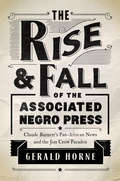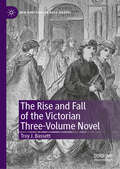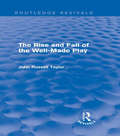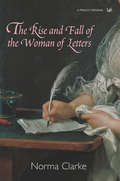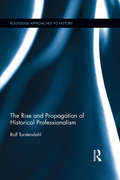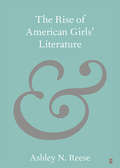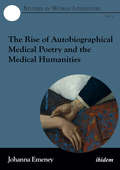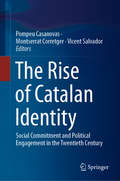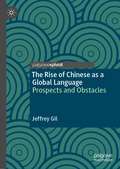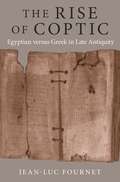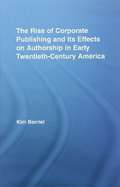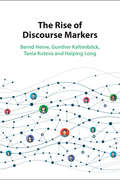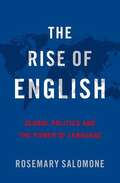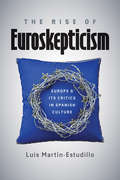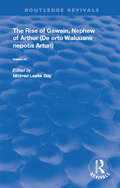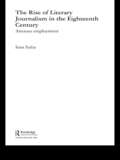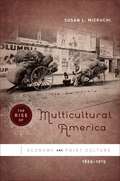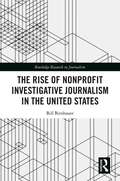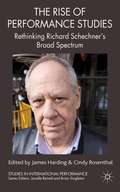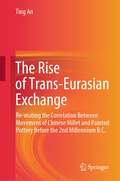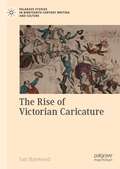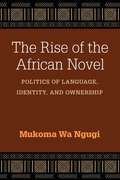- Table View
- List View
The Rise and Fall of the Associated Negro Press: Claude Barnett's Pan-African News and the Jim Crow Paradox
by Gerald HorneFor more than fifty years, the Chicago-based Associated Negro Press (ANP) fought racism at home and grew into an international news organization abroad. At its head stood founder Claude Barnett, one of the most influential African Americans of his day and a gifted, if unofficial, diplomat who forged links with figures as diverse as Jawaharlal Nehru, Zora Neale Hurston, and Richard Nixon. Gerald Horne weaves Barnett's fascinating life story through a groundbreaking history of the ANP, including its deep dedication to Pan-Africanism. An activist force in journalism, Barnett also helped send doctors and teachers to Africa, advised African governments, gave priority to foreign newsgathering, and saw the African American struggle in global terms. Yet Horne also confronts Barnett's contradictions. A member of the African American elite, Barnett's sympathies with black aspirations often clashed with his ethics and a powerful desire to join the upper echelons of business and government. In the end, Barnett's activist success undid his work. Horne traces the dramatic story of the ANP's collapse as the mainstream press, retreating from Jim Crow, finally covered black issues and hired African American journalists.
The Rise and Fall of the Victorian Three-Volume Novel (New Directions in Book History)
by Troy J. BassettUtilizing recent developments in book history and digital humanities, this book offers a cultural, economic, and literary history of the Victorian three-volume novel, the prestige format for the British novel during much of the nineteenth century. With the publication of Walter Scott’s popular novels in the 1820s, the three-volume novel became the standard format for new fiction aimed at middle-class audiences through the support of circulating libraries. Following a quantitative analysis examining who wrote and published these novels, the book investigates the success of publisher Richard Bentley in producing three-volume novels, the experiences of the W. H. Smith circulating library in distributing them, the difficulties of authors such as Robert Louis Stevenson and George Moore in writing them, and the resistance of new publishers such as Arrowsmith and Unwin to publishing them. Rather than faltering, the three-volume novel stubbornly endured until its abandonment in the 1890s.
The Rise and Fall of the Well-Made Play (Routledge Revivals)
by John Russell TaylorFirst published in 1967, this title considers the idea of the ‘well-made play’ in the context of how and why it has been devalued and how far, in allowing it to be devalued, we have lost sight of certain important elements of the theatre. The focus of the book is largely on the development of British theatre and those who have been instrumental to it. This is an indispensable introduction for any student with an interest in the history and development of the British theatre.
The Rise and Fall of the Woman of Letters
by Norma ClarkeIf Aphra Benn is widely regarded as the first important woman writer in English, who was the second? In literary history, the eighteenth century belongs to men: Pope and Swift, Richardson and Fielding. Asked to name a woman, even the specialist stumbles. Jane Austen? She didn't publish until 1811. Aphra Benn herself? She died in 1869.The Rise and Fall of the Woman of Letters tells the remarkable but little-known story of women writers in the eighteenth century - of poets, critics, dramatists and scholars celebrated in their own time but all but forgotten by the beginning of the new century. Eliza Haywood, Catherine Cockburn, Elizabeth Elstob, Delarivier Manley, Elizabeth Rowe, Jane Barker, Elizabeth Thomas, Anna Seward... In a book which ranges from country house to Grub Street, Norma Clarke recovers these and other writers, establishes the reasons for their eclipse and discovers that a room of one's own in the eighteenth century was as likely to be a prison cell as a boudoir.
The Rise and Propagation of Historical Professionalism (Routledge Approaches to History)
by Rolf TorstendahlThis book examines the evolution of historical professionalism, with the development of an international community that shares a set of values regarding both methodological minimum demands and what constitutes new results. Historical professionalism is not a fixed set of skills, but a concept with varying import and meaning at different times depending on changing norms. Torstendahl covers the propagation of these different ideals and of new educational forms from the late 18th century to the present, from Ranke’s state-centrism to a historiography borne by social theories.
The Rise of American Girls' Literature (Elements in Publishing and Book Culture)
by Ashley N. ReeseThis Element looks at the publishing history of the genre, girls' literature, in the United States spanning 1850–1940. The genre is set in context, beginning with an examination of the early American women's literature that preceded girls' literature. Then the Element explores several sub-genres of girls' literature, the family story, orphan story, school story, as well as African American girls' literature. Underpinning each of these stories is the bildungsroman, which overwhelmingly ends with girls 'growing down' to marry and raise children, following the ideals outlined in the cult of domesticity.
The Rise of Autobiographical Medical Poetry and the Medical Humanities (Studies in World Literature #5)
by Johanna EmeneyIn this fascinating book, Johanna Emeney examines the global proliferation of new poetry related to illness and medical treatment from the perspective of doctors, patients, and carers in light of the growing popularity of the medical humanities. She provides a close analysis of poetry from New Zealand, the U.S., and the U.K. that deals with sociological and philosophical aspects of sickness, ailment, medical treatment, care, and recuperation.
The Rise of Catalan Identity: Social Commitment and Political Engagement in the Twentieth Century
by Pompeu Casanovas Montserrat Corretger Vicent SalvadorThis volume helps us to understand that the current political disorders in Catalonia have deep cultural roots. It focuses on the rise of Catalan cultural, national and linguistic identity in the 20th century. What is happening in Catalonia? What lies behind its political conflicts? Catalan identity has been evolving for centuries, starting in early medieval ages (11th and 12lve centuries). It is not a modern phenomenon. The emergence of imperial Spain in the 16 c. and the French Ancien Régime in the 17 c. correlates with a decline of Catalan culture, which was politically absorbed by the Spanish state after the conquest of Barcelona in 1714. However, Catalan language and culture flourished again under the stimulus of the European Romantic Nationalism movement (known as the Renaixença in Catalonia). During the first Dictatorship (Primo de Rivera, 1923-1930), the Spanish Civil War (1936-1939), and the long Francoist era (1939-1975), Catalan language and culture were repressed, yet refurbished and reconstructed at the same time. This rise of a plural, complex, and non-homogeneous Catalan identity constitutes the subject matter of this volume. National conflicts that emerged later in the Spanish democratic state leant heavily on the life engagement and vital commitment experienced by the entrenched intellectual movements of the twentieth century in Catalonia, Valencian Country and the Balearic Islands. This book reveals the cultural and literary grassroots of these conflicts.
The Rise of Chinese as a Global Language: Prospects and Obstacles
by Jeffrey GilThis book investigates the macroacquisition of Chinese – its large-scale acquisition and adoption for various purposes by individuals, governments and organisations – and the implications of this process for the future of English as a global language. The author contextualises the macroacquisition of Chinese within the global ecology of languages, then analyses the factors responsible for the macroacquisition of Chinese, showing, in contrast to most academic and popular commentary, that a character-based writing system will not stop Chinese from becoming a global language. He then articulates three possible future scenarios: English remaining a dominant global language, English and Chinese both being global languages, and Chinese becoming a global language instead of English. The book concludes by outlining directions for further research on the acquisition and use of Chinese around the world. It will be of interest to students and scholars with an interest in English as a global language, Chinese as a second/foreign language, language education policy, and applied linguistics more generally.
The Rise of Coptic: Egyptian versus Greek in Late Antiquity (The Rostovtzeff Lectures #5)
by Jean-Luc FournetCoptic emerged as the written form of the Egyptian language in the third century, when Greek was still the official language in Egypt. By the time of the Arab conquest of Egypt in 641, Coptic had almost achieved official status, but only after an unusually prolonged period of stagnation. Jean-Luc Fournet traces this complex history, showing how the rise of Coptic took place amid profound cultural, religious, and political changes in late antiquity.For some three hundred years after its introduction into the written culture of Egypt, Coptic was limited to biblical translation and private and monastic correspondence, while Greek retained its monopoly on administrative, legal, and literary writing. This changed during the sixth century, when Coptic began to penetrate domains that were once closed to it, such as literature, liturgy, regulated transactions between individuals, and communications between the state and its subjects. Fournet examines the reasons for Coptic's late development as a competing language—which was unlike what happened with other vernacular languages in Near Eastern Greek-speaking societies—and explains why Coptic eventually succeeded in being recognized with Greek as an official language.Incisively written and rich with insights, The Rise of Coptic draws on a wealth of archival evidence to shed new light on the role of monasticism in the growing use of Coptic before the Arab conquest.
The Rise of Corporate Publishing and Its Effects on Authorship in Early Twentieth Century America (Literary Criticism and Cultural Theory)
by Kim BecnelThis study examines the way that the modernization and incorporation of the American publishing industry in the early twentieth century both helped to foment the emerging late industrial cultural hierarchy and capitalized on that same hierarchy to increase readership and profits. More importantly, however, it attempts to trace the ways in which recently-introduced marketing techniques, reconceived ideas of audience, and new paradigms in author-publisher relations affected American writers of the 1930s and the literature they produced. Using case studies of authors chosen from various points on the spectrum of so-called high-, middle-, and lowbrow literature, the author demonstrates that, contrary to popular critical opinion, this new publishing landscape--dominated by big-business practices and strict categorizations of audiences, writers, and works--did not ruin or corrupt literature but in fact enriched our literary heritage by providing authors with inspiration and opportunity that they may not otherwise have had.
The Rise of Discourse Markers
by Tania Kuteva Bernd Heine Haiping Long Gunther KaltenböckDiscourse markers constitute an important part of linguistic communication, and research on this phenomenon has been a thriving field of study over the past three decades. However, a problem that has plagued this research is that these markers exhibit a number of structural characteristics that are hard to interpret based on existing methodologies, such as grammaticalization. This study argues that it is possible to explain such characteristics in a meaningful way. It presents a cross-linguistic survey of the development of discourse markers, their important role in communication, and their relation to the wider context of sociocultural behaviour, with the goal of explaining their similarities and differences across a typologically wide range of languages. By giving a clear definition of discourse markers, it aims to provide a guide for future research, making it essential reading for students and researchers in linguistics, and anyone interested in exploring this fascinating linguistic phenomenon.
The Rise of English: Global Politics and the Power of Language
by Rosemary SalomoneSpoken by a quarter of the world's population, English is today's lingua franca--its common tongue. The language of business, popular media, and international politics, English has become commodified for its economic value and increasingly detached from any particular nation. This meteoric "rise of English" has many obvious benefits to communication. Tourists can travel abroad with greater ease. Political leaders can directly engage their counterparts. Researchers can collaborate with foreign colleagues. Business interests can flourish in the global economy. But the rise of English has very real downsides as well. In Europe, imperatives of political integration, job mobility, and university rankings compete with pride in national language and heritage as countries like France attempt to curb its spread. In India, South Africa, Morocco, Rwanda, and elsewhere, it has stratified society along lines of English proficiency, devalued commonly spoken languages, and generated tense legal conflicts. In Anglophone countries like the United States and England, English isolates us from the cultural and economic benefits of speaking other languages. With The Rise of English, Rosemary Salomone offers a commanding view of the unprecedented spread of English and the far-reaching effects it has on global and local politics, economics, media, education, and business. From the inner workings of the European Union to China's use of language as "soft power" in Africa, Salomone draws on a wealth of research to tell the complex story of English--and, ultimately, to argue for English not as a force for domination but as a core component of multilingualism and the transcendence of linguistic and cultural borders. ROSEMARY SALOMONE is the Kenneth Wang Professor of Law at St. John's University School of Law (USA). Trained as a linguist and a lawyer, she is an internationally recognized expert and commentator on language rights, education law and policy, and comparative equality. An elected member of the American Law Institute and fellow of the American Bar Foundation, she is a former faculty member of the Graduate School of Education at Harvard University, lecturer in Harvard's Institute for Educational Management, and trustee of the State University of New York. Her books include True American; Same, Different, Equal; Visions of Schooling; and Equal Education Under Law.
The Rise of Euroskepticism: Europe and Its Critics in Spanish Culture
by Luis Martin-EstudilloCovering from 1915 to the present, this book deals with the role that artists and intellectuals have played regarding projects of European integration. Consciously or not, they partake of a tradition of Euroskepticism. Because Euroskepticism is often associated with the discourse of political elites, its literary and artistic expressions have gone largely unnoticed. This book addresses that gap.Taking Spain as a case study, author Luis Martín-Estudillo analyzes its conflict over its own Europeanness or exceptionalism, as well as the European view of Spain. He ranges from canonical writers like Unamuno, Ortega y Gasset, and Zambrano to new media artists like Valeriano López, Carlos Spottorno, and Santiago Sierra. Martín-Estudillo provides a new context for the current refugee crisis, the North-South divide among EU countries, and the generalized disaffection toward the project of European integration.The eclipsed critical tradition he discusses contributes to a deeper understanding of the notion of Europe and its institutional embodiments. It gives resonance to the intellectual and cultural history of Europe's "peripheries" and re-evaluates Euroskeptic contributions as one of the few hopes left to imagine ways to renew the promise of a union of the European nations.
The Rise of Euroskepticism: Europe and Its Critics in Spanish Culture
by Luis Martin-EstudilloElectronic open access edition funded by the National Endowment for the Humanities. Covering from 1915 to the present, this book deals with the role that artists and intellectuals have played regarding projects of European integration. Consciously or not, they partake of a tradition of Euroskepticism. Because Euroskepticism is often associated with the discourse of political elites, its literary and artistic expressions have gone largely unnoticed. This book addresses that gap. Taking Spain as a case study, author Luis Martín-Estudillo analyzes its conflict over its own Europeanness or exceptionalism, as well as the European view of Spain. He ranges from canonical writers like Unamuno, Ortega y Gasset, and Zambrano to new media artists like Valeriano López, Carlos Spottorno, and Santiago Sierra. Martín-Estudillo provides a new context for the current refugee crisis, the North-South divide among EU countries, and the generalized disaffection toward the project of European integration. The eclipsed critical tradition he discusses contributes to a deeper understanding of the notion of Europe and its institutional embodiments. It gives resonance to the intellectual and cultural history of Europe's "peripheries" and re-evaluates Euroskeptic contributions as one of the few hopes left to imagine ways to renew the promise of a union of the European nations.
The Rise of Gawain, Nephew of Arthur (Routledge Revivals)
by Mildred Leake DayPublished in 1984: The Rise of Gawain, Nephew of Arthur is an exciting adventure story of the training, testing, and recognition of knighthood in King Arthur's court. The setting is the historical world of the fifth century: Rome, Jerusalem, Britannia. Atleast one copy of the story circulated in England, apparently influencing Sir Gawain and the Green Knight and the Faerie Queene, Book 1.
The Rise of Heritage
by Astrid SwensonWhere does our fascination for 'heritage' originate? This groundbreaking comparative study of preservation in France, Germany and England looks beyond national borders to reveal how the idea of heritage emerged from intense competition and collaboration in a global context. Astrid Swenson follows the 'heritage-makers' from the French Revolution to the First World War, revealing the importance of global networks driving developments in each country. Drawing on documentary, literary and visual sources, the book connects high politics and daily life and uncovers how, through travel, correspondence, world fairs and international congresses, the preservationists exchanged ideas, helped each other campaign and dreamed of establishing international institutions for the protection of heritage. Yet, these heritage-makers were also animated by fierce rivalry as international tension grew. This mixture of international collaboration and competition created the European culture of heritage, which defined preservation as integral to modernity, and still shapes current institutions and debates.
The Rise of Literary Journalism in the Eighteenth Century: Anxious Employment (Routledge Studies in Eighteenth-Century Literature #Vol. 3)
by Iona ItaliaRecent years have witnessed a heightened interest in eighteenth-century literary journalism and popular culture. This book provides an account of the early periodical as a literary genre and traces the development of journalism from the 1690s to the 1760s, covering a range of publications by both well-known and obscure writers. The book's central theme is the struggle of eighteenth-century journalists to attain literary respectability and the strategies by which editors sought to improve the literary and social status of their publications.
The Rise of Multicultural America
by Susan L. MizruchiBetween the Civil War and World War I the United States underwent the most rapid economic expansion in history. At the same time, the country experienced unparalleled rates of immigration. In The Rise of Multicultural America, Susan Mizruchi examines the convergence of these two extraordinary developments. No issue was more salient in postbellum American capitalist society, she argues, than the country's bewilderingly diverse population. This era marked the emergence of Americans' self-consciousness about what we today call multiculturalism.Mizruchi approaches this complex development from the perspective of print culture, demonstrating how both popular and elite writers played pivotal roles in articulating the stakes of this national metamorphosis. In a period of widespread literacy, writers assumed a remarkable cultural authority as best-selling works of literature and periodicals reached vast readerships and immigrants could find newspapers and magazines in their native languages. Mizruchi also looks at the work of journalists, photographers, social reformers, intellectuals, and advertisers. Identifying the years between 1865 and 1915 as the founding era of American multiculturalism, Mizruchi provides a historical context that has been overlooked in contemporary debates about race, ethnicity, immigration, and the dynamics of modern capitalist society. Her analysis recuperates a legacy with the potential to both invigorate current battle lines and highlight points of reconciliation.
The Rise of NonProfit Investigative Journalism in the United States (Routledge Research in Journalism)
by Bill BirnbauerWith a foreword from Michael Schudson, The Rise of Nonprofit Investigative Journalism in the United States examines the rapid growth, impact and sustainability of not-for-profit investigative reporting and its impact on US democracy and mainstream journalism. The book addresses key questions about the sustainability of foundation funding, the agendas of foundations, and the ethical issues that arise from philanthropically funded journalism. It provides a theoretical framework that enables readers to recognize connections and relationships that the nonprofit accountability journalism sector has with the economic, political and mainstream media fields in the United States. As battered news media struggled to survive the financial crisis of 2007-2009, dozens of investigative and public service reporting startups funded by foundations, billionaires and everyday citizens were launched to scrutinize local, state and national issues. Foundations, donors and many journalists believed there was a crisis for investigative journalism and democracy in the United States. This book challenges this and argues that legacy editors acted to quarantine their investigative teams from newsroom cuts. It also demonstrates how nonprofit journalism transformed aspects of journalistic practice. Through detailed research and practical discussion, it provides a comprehensive study of this increasingly important genre of journalism. The Rise of Nonprofit Investigative Journalism in the United States is an important text for academics and students of journalism, communications theory, media and democracy-related units, as well as journalists worldwide.
The Rise of Performance Studies
by James M. Harding Cindy RosenthalThe essays in this anthology are situated within the larger context of a critical engagement with Richard Schechner's work as a theatre practitioner, teacher, scholar, activist, and visionary. Through a wide variety of approaches, the contributors acknowledge the profound impact that Schechner's work has had on our understanding of performance as a mode of cultural practice and on the emergence of Performance Studies as a discipline. Some essays are embedded in intensely personal reflections on Schechner's work as a practitioner and teacher, while others take stock of critical concepts that are central to Schechner's work as a theorist and scholar. Yet it is not enough to say that the essays offer a critical survey of the broad spectrum of Schechner's cultural and intellectual endeavours. The essays all converge in an acknowledgement that few individuals within the theatre and performance communities have positioned their work so consistently or so consequentially as Schechner has within the key debates that have defined Performance Studies as a discipline.
The Rise of Trans-Eurasian Exchange: Re-visiting the Correlation Between Movement of Chinese Millet and Painted Pottery Before the 2nd Millennium B.C.
by Ting AnThis book has re-visited two distinctive patterns, namely pottery and millet, the movement of both of which conflict with conventional narratives concerning prehistoric trans-Eurasian exchange. The significance of this lies beyond the simple matter of chronology, but rests on the relationship between the movement of agricultural resources and of other items of material culture. Studies on early west–east interaction have attracted researchers from various disciplines, such as archaeology, history, Asian studies, art history, etc. Pursuing an archaeological approach, the book re-examines two of the earliest evidences of trans-Eurasian cultural exchange. The book is intended for researchers who are interested in prehistory, archaeobotany, pottery studies and comparative studies of early civilizations.
The Rise of Victorian Caricature (Palgrave Studies in Nineteenth-Century Writing and Culture)
by Ian HaywoodThis book serves as a retrieval and reevaluation of a rich haul of comic caricatures from the turbulent years between the Reform Bill crisis of the early 1830s and the rise and fall of Chartism in the 1840s. With a telling selection of illustrations, this book deploys the techniques of close reading and political contextualization to demonstrate the aesthetic and ideological clout of a neglected tranche of satirical prints and periodicals dismissed as ineffectual by historians or distasteful by contemporaries. The prime exhibits are the work of Robert Seymour and C.J. Grant giving acerbic comic edge to the case for reform against class and state oppression and the excesses of the monarchical regime under the young Queen Victoria.
The Rise of Writing
by Deborah BrandtMillions of Americans routinely spend half their working day or more with their hands on keyboards and their minds on audiences - writing so much, in fact, that they have less time and appetite for reading. In this highly anticipated sequel to her award-winning Literacy in American Lives, Deborah Brandt moves beyond laments about the decline of reading to focus on the rise of writing. What happens when writing overtakes reading as the basis of people's daily literate experience? How does a societal shift toward writing affect the ways that people develop their literacy and understand its value? Drawing on recent interviews with people who write every day, Brandt explores this major turn in the development of mass literacy and examines the serious challenges it poses for America's educational mission and civic health.
The Rise of the African Novel: Politics of Language, Identity, and Ownership (African Perspectives)
by Mukoma Wa NgugiThe Rise of the African Novel is the first book to situate South African and African-language literature of the late 1880s through the early 1940s in relation to the literature of decolonization that spanned the 1950s through the 1980s, and the contemporary generation of established and emerging continental and diaspora African writers of international renown. Calling it a major crisis in African literary criticism, Mukoma Wa Ngugi considers key questions around the misreading of African literature: Why did Chinua Achebe’s generation privilege African literature in English despite the early South African example? What are the costs of locating the start of Africa’s literary tradition in the wrong literary and historical period? What does it mean for the current generation of writers and scholars of African literature not to have an imaginative consciousness of their literary past? While acknowledging the importance of Achebe’s generation in the African literary tradition, Mukoma Wa Ngugi challenges that narrowing of the identities and languages of the African novel and writer. In restoring the missing foundational literary period to the African literary tradition, he shows how early South African literature, in both aesthetics and politics, is in conversation with the literature of the African independence era and contemporary rooted transnational literatures. This book will become a foundational text in African literary studies, as it raises questions about the very nature of African literature and criticism. It will be essential reading for scholars of African literary studies as well as general readers seeking a greater understanding of African literary history and the ways in which critical consensus can be manufactured and rewarded at the expense of a larger and historical literary tradition.
